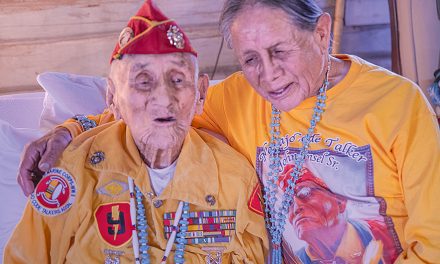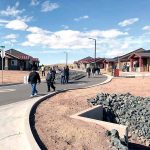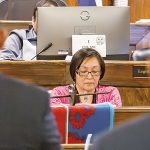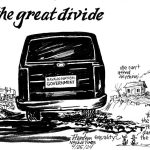
Letters: Reporters are bravest among civilians
Journalism is suffering all over the world. We pray for the safety of those putting their lives on the line to report the truth; to tell us about the corruption, the greed, the violence and crimes against the innocent and vulnerable.
They are the bravest among civilians to hang out there like flower petals in a raging storm.
Arlyssa’s words (“Delegate needs to learn humility, service,” Nov. 7, 2019) showed the real difference in real journalism and what is happening all around us from faux news to the bravery of people like Jamal Khashoggi.
If our official newspaper can be used as a bully pulpit for someone protecting a powerful relative … Arlyssa should shake hands with her target and agree to disagree.
We only have room for real news. That kind of gossip and backstabbing belongs on a piece of paper to be burned and buried in the dirt.
Barbara J. Morgan
Shiprock, N.M.
Complying with codes of conduct, ethics
Commentary to the Reporter’s Notebook of Ms. Arlyssa Becenti, “Delegate needs to learn humility, service” (Nov. 7, Navajo Times issue, Page A-7).
Her observation, “… your hostile antics and your infamous passive aggressiveness do not confound your colleagues … They revel in it and follow suit, actually.”
This leaves an impression our people in public service are no better in complying with established codes of conduct and ethics in government. This is the very reason why others who played the childish game of “follow-the-leader” were replaced.
The ambitious attitude of “just me-me, nobody-else-but-me, it is all-about-me,” is what distorts flow of energy and incites violence. Worst yet the enablers afraid to counteract brisk fury, but just brave enough to waste time and energy to nitpick at their petty annoyance is like trying to shoo away a mosquito.
Our Navajo culture and tradition flow in circular motion within a sphere of cycles. Our crude copy of our political governing system is triangular and our laws and policies are intersecting linear parallel lines of walls. Our education from obsolete textbooks results as echoes within a square box.
Our elected public officials are volunteers initially without political experience, selected by the voting public for sentimental value or by persuasion with whatever scam or propaganda, disguised as feel-good ideology. In actuality, so-called “political power” should be based on their ability to respond and account for public granted outcome from their influence for the greater good.
However, what is with this audacity and absurdity that an elected public servant is “king or queen of the hill with a personal agenda”? What is expected of government is to achieve political impact, instill social order, and seek social justice for its citizens and roll onward with it.
And when a government practices violence, induces fear and acts out its insanity towards its citizens it has deteriorated into a sick society. This sickness arouses nightmares of “what if” to the future and regrets of “should have” of the past.
And known by their feeding habits, the very few in government hide in the darkness because they are afraid of the light of public awareness, which could expose their shadows. They distract public attention by bullying with insults and accusations, thus feeding on the energy of others to weaken them.
Our reaction through violence is our prominent social problem, which undermines everything good within our society. This violence may be what reawakens the prophecy of our forefathers, the return of “Yeitso — a huge, overwhelming fear” to consume us all.
This hunger for intrusion is an invasion of dignity and personal space. This violence is to force energy to alter or replace what is now with what it should be from thereafter. Whether behind closed doors of government, in the streets, in the courts, within the educational system, in business, in homes, and of course, within ourselves, our compulsion festers.
This duress manifests as pestering, jealousy, bullying, insult, egoism, criminal activity, physical assault, rule, law, assimilation, and sadly, simple obedience. With chaotic outburst and violent confusion within our system why do we still expect trust, service, humility, and reverence from those elected public servants who prostitute their sacred vow they swore to uphold and protect?
Social justice for all cannot be achieved with a well-versed imitative education nor will pieces of paper bring about peace and beauty, and there is a big difference between learning (to copy) and realizing (knowing what is real). Perhaps public service is listening, observing, accounting then responding accordingly?
With instinct the sincerity of the intent is what determines how well we walk through the fire of truth without getting burned. This is what cleanses and motivates to support life, critically thinking, thus set a course, inspire cooperation, simplify problems, serve others, and become one with the collective energy, an energy that shares and heals, thus move towards a common vision for peace and freedom.
This is an authentic sovereignty of a people, and is not some adult-child playing pretend in their clubhouse.
Robert L. Hosteen
Beclabito, N.M.
Did not witness ‘verbal attack’ on reporter
This letter is written on behalf of Ms. Eugenia Charles-Newton, Council delegate from Shiprock. I am writing on what I have seen and heard at the Nov. 4 meeting of the Law and Order Committee at Nahata Dziil Chapter.
My wife and I arrived at the meeting at around 10:30 and listened to the presentations that were being made by the committee and comments by community members. The topic that was being discussed was the need for the presence of police officers within the community of Nahata Dziil. The lack of immediate law enforcement responses in the Nahata Dziil communities is a real disheartening situation for community members.
We have relocated into the community since 1988 and the provision of law enforcement has always been a problem and we wanted to know how the Navajo Nation was going to address our concerns.
It was during these discussions that I noticed references being made by three of the Council delegates speaking to the misquotations apparently that have been made by Ms. Becenti about prior meetings of the committee. One even made a comment about talking only in Navajo for fear of being misquoted by Ms. Becenti. Thus, it was not solely Ms. Charles-Newton making comments to Ms. Becenti.
At one point, Ms. Charles-Newton even politely asked Ms. Becenti if she understood the discussions to make sure she understood. Her reply was sort of on the defensive and antagonistic side.
Ms. Charles-Newton then asked to either see her notes or to speak about a comment. She came down to where Ms. Becenti was sitting and politely started talking to her and at that point she became defensive.
My wife asked that they should go outside and talk about the issue that they were concerned about because they were disturbing the session.
Ms. Charles-Newton asked Ms. Becenti to go outside at our request to continue that discussion without interrupting the meeting and Ms. Becenti refused. It would be easy to assume it may be for possible physical altercation, but the jest of the request was a polite invitation to continue the discussion.
I personally observed a total disrespect for our leaders in the midst of constituants. Having been a former Council delegate, I know the difficulties of trying to address the concerns of people when there is a disrespectful and antagonistic environment.
I did not witness any “verbal attack” on the part of Ms. Charles-Newton, only a congenial attempt to communicate with the people in the audience.
David J. Tsosie
Sanders, Ariz.
Community landfills are needed
On Nov. 11, 2019, I had a chance to attend a Veteran’s Day dinner at the Lukachukai Chapter House. I stepped into the meeting room with an audience of residents, veterans, an Arizona state official, and newly inducted Council delegate representing District 11 chapters.
Upon arrival at the chapter house, I saw and heard a country western band in front of the senior citizens center as if entertaining the parked cars and trucks. The country western music took me back to the time when the Wingate Valley Boys, the Fenders, the Thunders and other prominent bands would allow attendees to kick up their spurs and swing their partners to and fro on the field house floor next door.
I sat down and at one of the tables veneered with Veterans Day décor. A Marine Corps veteran was talking about a recent community cleanup of debris alongside Navajo Route 13 leading over Buffalo Pass. It was a veterans’ community project in-the-making from a few years back. I commend all veterans and family members who participated in the community cleanup. Ahe’hee. I understand participants enjoyed refreshments and tasty bites after the cleanup.
In the back of my mind, I thought about a community landfill that would prevent residents from disposing of litter, not only alongside NR13, but in the over-the-hill arroyos, gulley, ravines, and anywhere they could dump their trash like behind innocent cedar trees.
This community project is needed, not only in Lukachukai, but in other neighboring communities. But the hard part is when residents outright claim their land-use, home-site leases and grazing permits, which prevent community projects like a landfill and other relevant economic development ventures from being developed.
If this is the case in current scenarios, then how come uncared-for livestock are roaming alongside NR 12 and across Navajoland? The Diné-based economic threshold is exponentially there, but the community residents need to come to terms for specially designed marketplaces. Lukachukai Chapter has demonstrated this initiative before, and it certainly can be reinstituted. It takes a sense of ingenuity, creativity and innovation to see from within, not necessarily from without.
While I sat at the table listening to some of the speakers, I also thought about my fellow veterans who are walking the streets, cold and hungry, and digging around in the trash cans and bins for something to eat while liver sclerosis and diabetes are on the rise on Navajo.
There are many facets to the meaning of Veterans Day. The hard part again is we all don’t think on the same wavelength. The current Veterans Day festivity was mandated by the U.S. Congress (not Navajo) and thus, Nov. 11 of each year was federally declared as a Veterans Day holiday.
Yes, indeed, we served in all war eras beginning with the legendary twin warriors to World War I, World War II, Korea, Vietnam, and in the Middle East without questioning and hesitancy. In fact, our Diné language was used as a code during World War II.
But the point I am attempting to make is when a Diné warrior is discharged from military service, a cleansing and purification summer Diné Enemy Way traditional ceremony is performed over a returning warrior. This ceremony is performed to purge battle contamination and the oath for enlistment is eradicated through the ceremony. This ceremony is still followed today to restore personal harmony and balance and thus, the rehabilitation process begins.
The U.S. Veterans Administration hospitals do not have an effective mechanism, i.e., procedures, methodology and structure in place to fully rehabilitate combat veterans who are experiencing different levels of post-traumatic stress disorder and other health issues. These issues should be the objective talking points in bringing about start-up funding for culturally tailored service delivery on Navajo.
So this means rather than dwell on horrors of war stories, why can’t we emphasize and introduce workable veterans community projects?
Many veterans are skilled carpenters, masons, know about basic electricity, welding, and some can repair and rebuild automobile engines even without certification.
Why can’t a workforce be introduced by sending veterans to attend technical, vocational and building trade schools to become certified and, upon completion, they can become an invaluable conduit to training other veterans in noted skill areas.
For instance, a seven-point economic recovery plan was introduced for veterans during the latter part of the 1980s at Lukachukai Chapter under the Lee/Thompson Chapter administration. This initiative brought in revenue for the local veterans subcommittee.
In fact, machinery was purchased to start the Veteran’s Carpentry Demonstration Project through the concept of veterans helping veterans, but this project endeavor was short-lived due to not following OSHA building codes and standards. Had the Navajo Division of Community Development stepped in and provided technical assistance, the veterans project would have been flourishing today. Instead, we received a low blow south of the rez border.
Despite the absence of desired talking points, I still enjoyed being with my fellow veterans and community members. I also enjoyed a potluck-style meal with my wife and I look forward to the introduction of viable and meaningful veterans projects to come. I remain optimistic.
Anthony Lee Sr.
Lukachukai, Ariz.
Store manager wouldn’t accept card, phone call order
I’d like to say how thankful I am to all our veterans and those who are currently serving home and abroad for our country.
One of those brave men was my dad, Gerald Cly Sr., who served during the Vietnam War.
A disheartening event happened with the store manager at Goulding’s Grocery Store over a cake I wanted to purchase for my dad to honor him. I was told that it was against company policy to receive payment for anything over the phone and how would I like it if someone purchased on my card and it wasn’t me?
He continued to reprimand me over the phone. I told him this policy was a disadvantage to those who can’t drive the distance to be there. He then told me next time send a gift card or a check to your dad. He then said goodbye and hung up on me.
So I called my dad and told him thanks for your service, Happy Veterans Day, sorry about the cake.
Gerald Cly Sr. has proudly served his country and he is also the only postmaster in Monument Valley, and before that he retired from the Seventh Day Adventist Hospital as an accountant.
I also know personally how much he has written letters for those who couldn’t write and read letters for those that couldn’t understand English. Always helping his community in so many ways. He is a quiet guy and if he knew I was writing this I’m sure I would be in trouble.
Those of us that are away from home hit obstacles being two states away from my family — a cake can’t be bought for a veteran over the phone. Send a check to my dad? With rising gas prices and no banks in Monument Valley?
It is unfortunate to be treated with such disrespect on so many levels from a local business. They have no understanding of the needs. Sometimes these needs are very simple. The customer service I received was disheartening with no consideration for community members.
Larnetta Benally
Las Vegas, Nev.
The right leader is needed for education
Now that Tommy Lewis has made a smart decision to step away from running the Division of Diné Education, unfortunately for many of us parents the decision does not come soon enough.
As many of us have observed, DODE has been way too inactive and unmoving when it comes to improving our schools. The signs are everywhere, and we hear about it, not just from parents and students, but from anyone that values education.
More evidence comes forth daily. Look at the recent performance data released by the state Department of Education and the Bureau of Indian Education. Too many of our schools are on the list as underperforming.
It is inexcusable. The Navajo Nation, especially President Nez, the Navajo Nation Council, the Education Committee, and the Navajo Board of Education must do something.
That something is to hire a superintendent who knows how to improve schools, a leader who knows how to help teachers become better teachers, knows how to help administrators become better leaders, and knows how to help school boards become better boards. Do not make the same mistake by hiring someone with a modest track record of work in this field.
There is no doubt there are good teachers and administrators in our schools who need to be celebrated for their hard work at a school beset by challenges, particularly that majority of the students qualify for free or reduced lunch. Poverty and all of the hardships that come with it make learning and teaching a difficult task.
But clearly, Mr. President and Navajo Council members, with the right leader and staff of DODE, our schools can do better. In the right environment, our students will begin to make gains academically and one day catch their peers.
It is not rocket science. If you have the right leader (a real school leader) is what we need to begin making changes to improve our schools, rather than an educator whose experience is solely as an “education program administrator” and less as a K-12 school leader.
Unfortunately, DODE is heavily staffed with the latter and that is a major reason why there is little to no attention to making our schools better. The two offices that should be taking the lead, School Improvement and Office of Compliance, lack staff to deliver this type of leadership.
Nothing rings truer to parents than the fact that good teachers, strong principals, imaginative superintendents, and a skilled and supportive staff from DODE can make all the difference. We need people at DODE who have sufficient experience as a school-improvement leader, instructional and curriculum leader, and who have successful experience as a teacher and an administrator, especially in improving schools.
Too many of our Navajo students drop out and never graduate. Talk to dropouts and they will tell you that they leave school because they are bored, feel no one cares about them, or have other family needs they have to attend to.
The sad thing is that none of this is new. Past leaders have made the same blunder and that continues today, which is too many of our elected leaders don’t do enough to educate themselves or be educated to understand exactly what needs doing at DODE and throughout our education system.
For example Mr. President, to help address this underperformance situation, you should be looking for ways how Diné College and Navajo Technical University, including other universities who claim to support Navajo education, can assist improving Navajo K-12 schools. It doesn’t make any sense to continue to support them as “Navajo’s Higher Leading Institutions,” or to continue to send scarce tribal funds to nearby universities unless their focus includes an area that directly benefits Navajo K-12 school improvement.
If there is one thing you can do immediately Mr. President and Navajo Council members, you need an education adviser advising you what you should be doing and how to get this done.
Wallace Hanley
Window Rock, Ariz.
Environmentalists are modern day colonizers
Colonialism is defined as control by one power over a dependent area or people or a policy advocating or based on such control (Merriam-Webster).
This term would raise the eyebrows with indigenous peoples if mentioned in a discussion. I believe we all have a basic understanding of what it has done to our land and people.
So when I apply that definition to the current state of the Navajo Nation, there is one group that comes to mind — environmentalists. These are groups of people that are non-Native, do not live on the reservation and are advocating a policy that aims to control the natural resources on Navajo land.
Now they have our own people advocating their policy to our elected leadership. With the use of the Internet and college life, these people capture our youth and brainwash them to think like they do.
Their advocacy is impacting our everyday life now. The Hopi Tribe had to kick them off their reservation because they weren’t wanted there.
This reminds me of the 1994 movie “Higher Learning.” In the movie, they follow three freshman students that come from different backgrounds and tell the story through various stages that these kids go through while trying to fit in at college. Watch it and you’ll understand.
I look at these environmentalists through that lens and I ask what do they really do? Do they help our Navajo people?
I asked some people if they ever conducted or completed any projects on the Navajo Nation. The response was a resounding no, but they did say that they stayed and talked about how mining was bad and that it needed to stop, and that they were to stop the mining.
I asked miners about the environmentalists. They said they remember the environmentalists promised that renewables and solar projects would come but when Black Mesa Mine shut down, they left. No projects. No money. They did what they came to do and left the Navajo Nation to figure the rest of it. That was in 2005.
Let’s jump to 2019. Environmentalists now communicate through local environmental groups with the same intention of shutting down all the mines on Navajo Nation. Now they provide money to their local groups to let them do their dirty work.
All the while, Navajo miners and families fight to keep their jobs and livelihoods. Navajo Generating Station will be closed at the end of the year. Kayenta Mine is closed.
Did they provide any money to the Navajo Nation for solar projects? Or replace any of the revenue they helped eliminate? Nothing.
Now the environmentalists are attacking NTEC’s purchase of three mines in Wyoming and Montana. NTEC is simply seizing opportunities to create more revenue for the Navajo Nation and its workforce.
Environmentalists are now organized enough to influence local media, social media and elected leaders of the Navajo Nation. They now have the influence to control the Navajo Nation’s resources.
Modern day colonialism. Beware of the master of puppets.
Ruth Williams
Shiprock, N.M.
Don’t let Council fail NTEC
I’ve been reading in the papers how the Navajo Nation had to tap into the government reserves to make up for the shortfall in the 2020 budget because of the closures of Kayenta Mine and Navajo Generating Station, and the revenue they used to generate.
I’ve also been reading about the proposed legislation (No. 0319-19) against the Navajo Transitional Energy Company’s general indemnity agreement, which is needed to secure reclamation bonds. Combined, Peabody, SRP and NTEC had contributed approximately $100 million to the nation’s budget.
The legislative and executive branches are failing the Navajo people. They shut down Kayenta Mine and NGS without a plan to employ our people and now they want to do the same with NTEC. Now they are digging into our reserves to make up revenue for closing these coal operations.
Our leaders are estimating a $30- to $50-million decline in coal revenues for 2020. Now I’m reading that President Nez said the Council might decrease the amount available for economic development projects and allocate more to the General Fund. He stated it’s a short-term fix and “maybe” the nation will get additional revenue from tourism and renewable energy projects. Maybe? Really?
You close NGS and Kayenta Mine, which was generating $30- to $50 million annually with “maybe.” I think those maybes should have been in place first before they decided to close them down.
So this brings up the question, why are certain Council delegates working so hard against advancement on the Navajo Nation?
As I talk to people and listen to the radio, it appears there is a misunderstanding that NTEC gets its money from the General Fund. NTEC does not draw from the General Fund, the Sihasin Fund or Permanent Trust Fund. NTEC is purchasing the three mines in Montana and Wyoming from its own reserves, which it has generated from successfully operating the Navajo Mine near Shiprock.
Rather than these certain delegates or the “environmental” groups working against the Navajo people, we should be supporting our tribal coal company.
NTEC attempted to purchase Kayenta Mine and NGS, but the Council failed them and we heard crickets from the president’s office. NTEC was going to run those operations for 10 years, which would have given the nation ample time to figure out the “maybes.”
I heard from friends in Tuba City that people are already chopping down trees on Black Mesa and near Grand Canyon to stay warm this winter. I suspected this would happen once there was no longer public coal at Kayenta Mine. For the environmentalists who supported the closure of Kayenta Mine, how is deforestation any better?
Please, Navajo people, don’t fail NTEC like the executive and legislative branches did. Inform your delegates to vote against Legislation No. 0319-19. Don’t let the Council fail NTEC like they did the Kayenta and Black Mesa areas.
Alex Osif
Kayenta, Ariz.








 Highway 264,
Highway 264, I-40, WB @ Winslow
I-40, WB @ Winslow